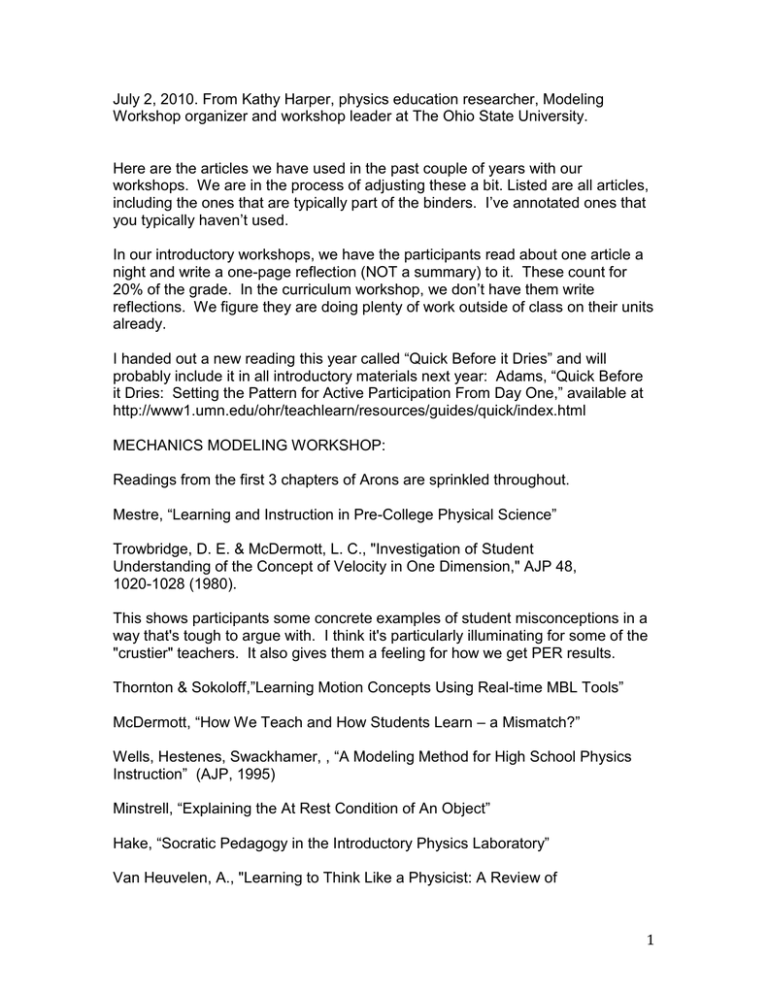July 2, 2010. From Kathy Harper, physics education researcher, Modeling
advertisement

July 2, 2010. From Kathy Harper, physics education researcher, Modeling Workshop organizer and workshop leader at The Ohio State University. Here are the articles we have used in the past couple of years with our workshops. We are in the process of adjusting these a bit. Listed are all articles, including the ones that are typically part of the binders. I’ve annotated ones that you typically haven’t used. In our introductory workshops, we have the participants read about one article a night and write a one-page reflection (NOT a summary) to it. These count for 20% of the grade. In the curriculum workshop, we don’t have them write reflections. We figure they are doing plenty of work outside of class on their units already. I handed out a new reading this year called “Quick Before it Dries” and will probably include it in all introductory materials next year: Adams, “Quick Before it Dries: Setting the Pattern for Active Participation From Day One,” available at http://www1.umn.edu/ohr/teachlearn/resources/guides/quick/index.html MECHANICS MODELING WORKSHOP: Readings from the first 3 chapters of Arons are sprinkled throughout. Mestre, “Learning and Instruction in Pre-College Physical Science” Trowbridge, D. E. & McDermott, L. C., "Investigation of Student Understanding of the Concept of Velocity in One Dimension," AJP 48, 1020-1028 (1980). This shows participants some concrete examples of student misconceptions in a way that's tough to argue with. I think it's particularly illuminating for some of the "crustier" teachers. It also gives them a feeling for how we get PER results. Thornton & Sokoloff,”Learning Motion Concepts Using Real-time MBL Tools” McDermott, “How We Teach and How Students Learn – a Mismatch?” Wells, Hestenes, Swackhamer, , “A Modeling Method for High School Physics Instruction” (AJP, 1995) Minstrell, “Explaining the At Rest Condition of An Object” Hake, “Socratic Pedagogy in the Introductory Physics Laboratory” Van Heuvelen, A., "Learning to Think Like a Physicist: A Review of 1 Research-based instructional Strategies," AJP 59, 891-897 (1991). I like this article because I think it presents a slightly different take on the same basic ideas that we're trying to get through to the teachers. It also provides a nice platform to tell them about the ALPS (although these seem to be out of print now). It also helps make a connection between what we do in the workshop and problem solving, which is always a concern of participants. Van Heuvelen, A. & Zou, X., "Multiple Representations of Work-Energy Processes," AJP 69, 184-194 (2001). This is one of the most valuable readings we use. So many of our participants haven't seen work-energy bar charts before, and this helps to sell them on it. (I highly recommend this one!) Swackhamer, “Making Work Work” We also include some other articles in our binder that we sometimes refer to – they also work well for a “make-up” assignment should someone have to miss a few hours of class at some point. They include Maloney, "Rule-governed Approaches to Physics - Newton's Third Law," This one is nice because it addresses the common student difficulties with N3L. It also exposes the teachers to a systematic way of looking at how a series of questions can probe for a consistently used wrong idea. Hammer, “Two Approaches to Learning Physics,” Beichner, “Test of Understanding Graphs – Kinematics” Reif, “Teaching Problem Solving, a Scientific Approach” CHEMISTRY Gabel, “Improving Teaching and Learning through Chemistry Education Research” Harrison & Treagust, “Secondary Students’ Mental Models of Atoms and Molecules: Implications for Teaching Chemistry” Wells, Hestenes, & Swackhamer, “A Modeling Method for High School Physics Instruction” (AJP, 1995) 2 Swackhamer, “Cognitive Resources for Understanding Energy” Bowen & Bunce, “Testing for Conceptual Understanding in General Chemistry” Gillespie, “The Great Ideas of Chemistry” Kind, “Beyond Appearances, Students’ Misconceptions About Basic Chemical Ideas” There are also readings from Karplus sprinkled in. THE ADVANCED CURRICULUM-WRITING WORKSHOP WE ALWAYS USE THESE THREE ON ALTERNATIVE PROBLEMS IN OUR 2ND-YEAR WORKSHOP: Van Heuvelen, A. & Maloney, D. P., "Playing Physics Jeopardy," AJP 67, 252-256 (1999). Maloney, D. P., "Ranking Tasks, A New Type of Test Item," JCST 510-514 (1987). Van Heuvelen, A., Allen, L., & Mihas, P., "Experiment Problems for Electricity and Magnetism," or Van Heuvelen, “Experiment Problems for Mechanics” We have worked hard to get the balance right between letting our secondyear curriculum development groups run with their project and providing some structure to help them stay on task and develop a sound product. With input from Doug Forrest, Heidi (Jackman) Kresge, and Nate Ash, we have turned this into a workshop that gets rave reviews. The participants this year generated some terrific products. We are looking to add someone with more advanced chemistry experience to the staff next year. Anyway, one of the things that we've done is come up with a list of "required elements" for the final unit, and when it's something that might be a little new for folks, we try to find a reading to match up with it and give them a little homework assignment. So we're scaffolding the unit development a bit. One of the things that (as you might guess) I'm big on is alternative problem types that are actually based on what we know about how experts and novices approach problems. We have the teachers read these three articles, usually 3 nights in a row, and usually starting around the end of the first week. A day or so after they've read all of them, we have everyone turn in 2 alternative problems (in any combination of types they wish), give them feedback, and then they include them in their final 3 unit. This has worked out well for us. I really like all of these articles. We may get rid of the experiment problem one, though, since it is nearly the same thing as a practicum. We have contemplated using one of the Heller articles that involves context-rich problems, too, but I don't remember if we ever have. We have handed it out to individuals. I am contemplating adding the recent Physics Teacher article by Maloney and Masters on reverse game play as an opportunity to illustrate scientific process because I think it could be helpful. As the advanced workshop and the Ohio Modeling program have developed further, we have had to change the way in which we use articles in the advanced workshop. We now have about half of our participants coming in to do chemistry projects, which has been a challenge for me, as a physicist. We are constantly striving to have less of a physics focus in the readings we assign, and when we know of a content-specific article, we often just give it to the relevant group for their reference. Below are ones we have used associated with specific topics OPTICS: Watts, D. M., "Student Conceptions of Light: A Case Study," Phys. Ed. 20, 183-187 (1985). It's a neat little easy-to-read article that, again, I think shows even the most experienced teachers some new ways their students may be thinking about optics. Doug and I liked it enough that we had them read it one year when everyone was still from physics, even though no one was working on optics. ELECTRICITY: N. Fredette and J. Lochhead, "Student Conceptions of Simple Electric Circuits", The Physics Teacher 19, 194-198 (1980) 194-198 This is easy to read and helps teachers to think about what might be going on in students' heads. Bat-Sheva Eylon & Uri Ganiel, "Macro-micro Relationships: the Missing Links", International Journal of Science Education 12(1) 79 - 94 (1990). This article is a tough read, used only with a fairly experienced group. MAGNETISM: David P. Maloney, "Charged poles?" Physics Education 20, 310-316 (1985) (on magnetism) An easy read, and a neat illustration of some work that is closely related to 4 ranking tasks. EQUILIBRIUM Raviolo, “Assessing Students’ Conceptual Understanding of Solubility Equilibrium” ENTROPY Hanson & Michalek, “Give Them Money: The Bolzmann Game” Lambert, “Entropy – A Cracked Crutch for Supporting Entropy Discussions” Lambert, “Entropy is Simple, Qualitatively” 5


